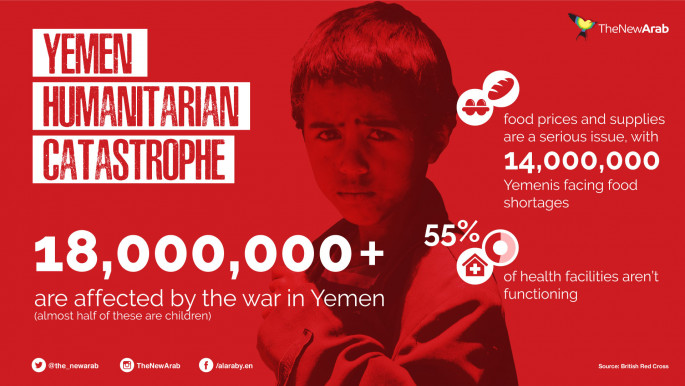Kidnapped Yemeni girl found 'with severed tongue' amid fears over rising abductions
The 9-year-old Lujain Mohammed was reported missing just three days earlier, triggering a search frenzy in the Houthi-controlled Sanaa city.
Local reports said the girl was found outside a zoo on Friday with burn marks on her body and her tongue was cut off. She showed clear signs of psychological distress, Al-Mashhad Al-Yemeni reported, noting the perpetrator of the devastating attack has yet to be identified or located.
Kidnappings have in recent years become more common in Yemen, where a five-year conflict has caused immeasurable damage to the country and society.
Two young boys were also reported missing in Yemen’s third largest city last week.
Mustafa Abdul Wasi, 13, and Awab Tarish, 14, went missing on Thursday evening in Taiz’s Dhabhan area.
Meanwhile, more than 300 women have been reportedly abducted by Houthi rebels, according to figures reported by Al-Mashhad Al-Yemeni.
Read more: Yemen in Focus: Cable damage wipes out 80% of country's internet connectivity
Yemen's conflict began in 2014 when the Houthi rebels overran the capital and other major cities in the north of the country, forcing the internationally-recognised government of Abedrabbo Mansour Hadi to flee to the southern port city of Aden, where it established a temporary capital.
The war escalated months later in March 2015 after a Saudi-led coalition intervened in the country, imposing a brutal bombing campaign that has since left thousands of civilians dead.
Tens of thousands of people have been killed and millions more displaced in what the United Nations has described as the world's worst humanitarian crisis.
 |
Last month, the International Rescue Committee warned Yemen's devastating war could see the country plunge into a darker abyss, noting another five years of the conflict could cost £22 billion.
Yemenis living in the country, which has suffered from nearly five years of war, are expected to require humanitarian assistance in 2020, analysis by the group said.
"2019 was a devastating year for civilians caught in crisis worldwide," said IRC president and CEO David Miliband.
"Across the globe, the scale of need in 2020 is … likely to stretch resources beyond their limit. It's vital that we do not abandon these countries when they need us most, and that governments around the world step up funding to these anticipated crises before more lives are lost – and the bill for humanitarian catastrophe rises."

![Palestinians mourned the victims of an Israeli strike on Deir al-Balah [Getty]](/sites/default/files/styles/image_684x385/public/2024-11/GettyImages-2182362043.jpg?h=199d8c1f&itok=xSHZFbmc)


![The law could be enforced against teachers without prior notice [Getty]](/sites/default/files/styles/image_684x385/public/2178740715.jpeg?h=a5f2f23a&itok=hnqrCS4x)
 Follow the Middle East's top stories in English at The New Arab on Google News
Follow the Middle East's top stories in English at The New Arab on Google News

![Palestinian journalists in West Bank [Getty]](/sites/default/files/styles/image_330x185/public/2167088057.jpeg?h=a5f2f23a&itok=smdkN-46)
